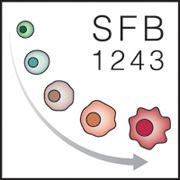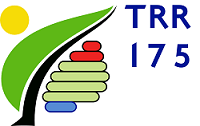Research Projects 2013
In the following you find a list of the offered projects for the LSM Summer Research Program 2013. There is given additional information, which methods will be applied during your work in a particular research group. As indicated, some of the supervisors expect a specific range of methods, you should be familiar with. Please, only choose a project, if you are sure to fulfill the requirements, if you are willed to perform full-time research (sometimes with late night and weekend work) and if you have a fundamental interest in the chosen research area.
Cell Biology
Dynamic modulation of epigenetic states in Drosophila development and regeneration
Research group: Dr. Anne Classen
Methods to be applied: fly genetics, tissue culture, confocal microscopy, RT-PCR or biochemistry
Expected range of methods: basics knowledge and methods in molecular and cell biology
Evolutionary Biology
Adaptive evolution of polycomb response elements
Research group: Prof. Dr. Wolfgang Stephan (direct supervisor: Dr. Stefan Laurent)
Methods to be applied: Analysis of whole-genome DNA sequences
Expected range of methods: Bioinformatics, population genetics
Genetics
Role of PKA-like kinase in carbon source triggered redirection of metabolic flux.
Research group: Prof. Dr. Michael Boshart
Methods to be applied: RT qPCR, Western blot, phosphospecific antibodies, immunoprecipitation, in situ epitope tagging, site directed mutagenesis
Expected range of methods: molecular biology, DNA cloning, transfection of trypanosomes
Additional comment: some previous lab experience of the applicant, at least at the level of advanced practical courses is required.
Microbiology
Identification of an AI-2 exporter in Vibrio harveyi
Research group: Prof. Dr. Kirsten Jung (direct supervisor: Dipl.-Biol. Matthias Reiger)
Methods to be applied: microbial and molecular methods
Expected range of methods: cloning, cultivation of bacteria, reporter enzyme assays
Pharmacology
Endolysosomal two-pore and TRPML channels and novel interaction partner
Research group: Prof. Dr. Martin Biel (direct supervisor: Dr. Christian Grimm)
Methods to be applied: Cell biology / molecular biology methods, FRET, patch clamp
Expected range of methods: Basic skills in molecular biology
Plant Sciences
Metabolic adaptations of Arabidopsis thaliana to changes in oxygen concentrations.
Research group: Prof. Dr. Peter Geigenberger
Functional genomic of photosynthesis in cyanobacteria
Research group: Prof. Dr. Jörg Nickelsen (direct supervisor: Dr. Birgit Rengstl)
Methods to be applied: cloning, transformation of Synechocystis sp. PCC 6803, physiological and biochemical characterization of mutant strains
Expected range of methods: Basic techniques of molecular biology and biochemistry, e.g. cloning, SDS-PAGE, Western analysis, recombinant protein expression, etc.
Metal transport in chloroplasts
Research group: PD Dr. Katrin Philippar
Methods to be applied: in vivo GFP-targeting, quantitative real time RT-PCR
Expected range of methods: standard molecular and biochmical techniques like PCR, cloning, restriction digest, RNA/DNA isolation, Western blotting
Does the C-termial sequence of albino4 (Alb4) from Arabidopsis interact with subunits of Ribosomes?
Research group: Prof. Dr. Juergen Soll/Dr. Elisabeth Ankele
Methods to be applied: Screening mutants (plant, cyanobacteria), cloning, protein isolation, SDS-PAGE including staining methods (Coomassie, silver stain, amino black stain), immunoblotting, overexpression and purification of antibodies, affinity chromatography with His-tagged proteins, subfractionation by density centrifugation
Expected range of methods: basic molecular biological and/or biochemistry skills essential like: DNA isolation or plasmid isolation from E. coli or protein isolatin; casting Agarose or Polyacrylamid gels; performing PCR reactions (preparation mastermix); screening isolated plasmids by restriction digest; preparation of buffers, media. Not essential but of advantage: working under sterile conditions
Additional comment: The proper candidate should have a strong interest in molecular biological lab work and should have lab experience (minimum student courses).
Protein import into chloroplasts
Research group: Prof. Dr. Juergen Soll/PD Dr. Bettina Boelter
Methods to be applied: SDS-PAGE, immunoblotting, protein expression and purification, molecular cloning, immunoprecipitation, cell fractination, organelle isolation
Expected range of methods: knowledge in biochemistry and molecular biology (DNA isolation, gel electrophoresis)
Function of molecular chaperones in organellar protein import
Research group: Prof. Dr. Juergen Soll/Dr. Serena Schwenkert
Methods to be applied: SDS-PAGE, immunoblotting, protein expression and purification, molecular cloning, immunoprecipitation
Expected range of methods: knowledge in biochemistry and molecular biology (DNA isolation, gel electrophoresis)
Systematic Botany
Taxonomic revision of Rochefortia Sw. (Ehretiaceae, Boraginales)
Research group: PD Dr. Marc Gottschling
Methods to be applied: morphology, anatomy, databasing (molecular systematics when indicated)
Additional comment: Rochefortia Sw. is exceptional within the Ehretiaceae (Boraginales) because of its spiny habit and the dioecious sex arrangement. The plants are distributed in the Caribbean and adjacent areas and may comprise not more than ten species. However, the taxon has not been critically revised since its first description in 1788. In this project, herbarium specimen data will be entered in Tropicos (Missouri Botanical Garden database), which will be the basis for distribution maps. The species will be morphologically investigated to delimitate and circumscribe species.
___________________________________________________________________________________
List of projects, which have been offered in Summer School 2012:
Cell Biology
- Epigentic plasticity during Drosophila development and regeneration
Research group: Dr. Anne Classen
Evolutionary Biology
- The effect of natural selection on innate immunity genes in Drosophila
Research group: Prof. Dr. Wolfgang Stephan (direct supervisor: Dr. Hutter S.)
Genetics
- PKA-like kinase of Trypanosoma: mutational analysis of subunit interaction and ligand binding.
Research group: Prof. Dr. Michael Boshart - Application of Transcription Activator Like Effector (TALE) proteins for precision genome engineering
Research group: Prof. Dr. Thomas Lahaye - Analysis of direct lipid-protein interactions
Research group: Dr. Thomas Ott (direct supervisor: Konrad Sebastian)
Microbiology
- Single-cell analysis of magnetoctactic bacteria from aquatic environments
Research group: Prof. Dr. Dirk Schüler (direct supervisor: Kolinko Sebastian) - Genome engineering in magnetotactic bacteria
Research group: Prof. Dr. Dirk Schüler (direct supervisor: Lohße Anna) - Analysis of magnetosome formation in magnetotactic bacteria
Research group: Prof. Dr. Dirk Schüler (direct supervisor: Raschdorf Oliver)
Plant Sciences
- Functional analysis of lysine-acetylation sites
Research group: Dr. Iris Finkemeier - Metabolic adaptations of Arabidopsis thaliana to changes in oxygen concentrations.
Research group: Prof. Dr. Peter Geigenberger - Biogenesis of Thylakoid Membranes
Research group: Prof. Dr. Jörg Nickelsen - Does the C-termial sequence of albino4 (Alb4) from Arabidopsis interact with subunits of Ribosomes?
Research group: Prof. Dr. Juergen Soll/Dr. Elisabeth Ankele - Metal transport in chloroplasts
Research group: Prof. Dr. Juergen Soll/Dr. Katrin Philippar - Function of molecular chaperones in organellar protein import
Research group: Prof. Dr. Juergen Soll/Dr. Serena Schwenkert - Calcium-Calmodulin Regulation in Plant Mitochondria
research group: Prof. Dr. Ute Vothknecht (direct supervisor: Dr. Chigri F.)
Pharmacology
- Antitumor effects of V-ATPase inhibition
Research group: Prof. Dr. Angelika Vollmar (direct supervisor: Dr. v. Schwarzenberg K.)
Systematic Zoology
- Validation of DNA-barcoding data on Bavarian arthropods.
Research group: Prof. Dr. Gerhard Haszprunar
Systematic Botany
- Natural lateral gene transfer -- the case of parasitic plants and their hosts
Research group: Prof. Dr. Susanne Renner
___________________________________________________________________________________
List of projects, which have been offered in Summer School 2011:
Genetics
- Chimeric regulatory subunits of PKA. More details (pdf, 20 kB)
Research group: Prof. Dr. Michael Boshart - Textbook biochemistry challenged: the unconventional citrate metabolism in parasitic Trypanosoma. More details (pdf, 20 kB)
Research group: Prof. Dr. Michael Boshart - Modulation of transcription via TAL effectors from the bacterial pathogen Xanthomonas
Research group: Prof. Dr. Thomas Lahaye - Decoding of calcium signatures during signal transduction in plant root symbiosis. More details
Research group: Prof. Dr. Martin Parniske - Plant receptor complexes involved in the perception of symbiotic microbial signals. More details
Research group: Prof. Dr. Martin Parniske
Cell Biology
- Role of bZIP transcription factors in C. elegans apoptosis
Research group: Prof. Dr. Barbara Conradt - Dynamic modulation of epigenetic states in Drosophila development and regeneration
Research group: Dr. Anne Classen - Protein mediated transdifferentiation (regenerative medicine)
Research group: Prof. Dr. Heinrich Leonhardt - Study of epigenetic mechanisms in development and disease
Research group: Prof. Dr. Heinrich Leonhardt - Mapping and characterization of a mutation that perturbs magnesium homeostasis
Research group: Prof. Dr. Eric Lambie
Plant Sciences
- Metabolic adaptations of Arabidopsis thaliana to changes in oxygen concentrations.
Research group: Prof. Dr. Peter Geigenberger - Biogenesis of chloroplasts
Research group: Prof. Dr. Juergen Soll - Protein translocation into chloroplasts
Research group: Dr. Bettina Boelter - Characterisation of calcium-regulated processes in plant organelles
research group: Prof. Dr. Ute Vothknecht
Systematics
- Resolving DNA-barcoding discrepance cases among Bavarian Lepidoptera. More details (pdf, 500 kB)
Research group: Prof. Gerhard Haszprunar
MicrobiologyDr.
- Stimulus perception by two-component systems in bacteria
Research group: Prof. Dr. Kirsten Jung - Significance of the L-proline metabolism for Helicobacter pylori. More details (pdf, 20 kB)
Research group: Prof. Dr. Heinrich Jung
Evolution
- Functional analysis of Drosophila gene regulatory sequences
Research group: Prof. John Parsch
Pharmacology
- Role of V-ATPase in tumor cell migration
Research group: Prof. Angelika Vollmar





